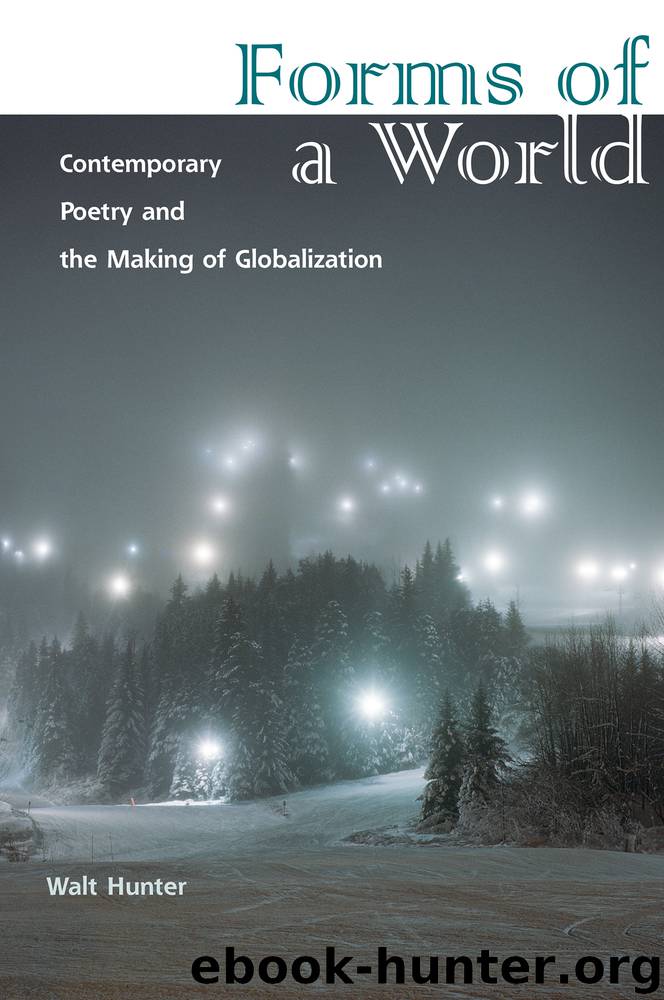Forms of a World by Hunter Walt;

Author:Hunter, Walt;
Language: eng
Format: epub
Publisher: Fordham University Press
Published: 2019-03-05T16:00:00+00:00
Coda
Near the beginning of Three Poems (1972), John Ashbery writes,
I’m sorry—in staring too long out over this elaborate view one begins to forget that one is looking inside, taking in the familiar interior which has always been there, reciting the only alphabet one knows. To escape in either direction is impossible outside the frost of a dream, and it is just this major enchantment that gave us life to begin with, life for each other. Therefore I hold you. But life holds us, and is unknowable.1
This passage is a defense of poetry in global terms. After beginning with a characteristically breezy, offhand apology, the poem first claims that the view of a certain “elaborate” external prospect might cause us to forget that the “alphabet” of poetry comes from limning a “familiar interior.” Then the poem moves inward, to the realm of “dream” and “enchantment,” as a contrast to the description of the outside prospect with which the passage begins. But this movement inside brings us into the domain of relationality with another person, not solipsism, and Ashbery proceeds to build the poetic address into an embrace. The poem then moves back outward to a sense of being held together by “unknowable” forces. Ashbery’s “I” constitutes a global subject to the extent that his subjectivity, like the poem itself, comprises such forces. The poem inverts the imperial gaze of its sovereign, white, U.S. male poetic speaker, who determines that the “elaborate view” before him is one of immanent rather than eminent domain, at one with the “major enchantment” that brings “life for each other.” This view requires both active care and the acknowledgment of precarity: the dependence upon unseen forces that exceed our forms of knowing. The poem is built through a dialectical movement in which the address to and care for the other’s welfare is transformed into an enchanted sense of being grasped by the world, an ecstatic process of encountering the unknowable in the alphabet of the known.
Ashbery’s ethical and oneiric language in Three Poems stands at an oblique angle to the brutality of the early 1970s—the dawning of our current “global age,” as Martin Albrow names it in his eponymous study.2 And yet the precise meaning, political valence, and general usefulness of “global” as a term to describe this period remain unsettled and subject to intense debate. This book has turned to contemporary Anglophone poets, writing from a variety of positions in the world economy, for a reconsideration of what “global” signifies and for the terms, keywords, and concepts we might use to grasp it. As the work of these poets suggests, a reappraisal of the global also requires a reassessment of the literary historical forms of poetry in English. Ashbery’s example is an outlier when placed next to the more explicit test cases in the rest of this book. Nevertheless, the curious semantic field of “The New Spirit” makes sense when its global conditions are restored and its dynamic movement through these conditions is made explicit. The
Download
This site does not store any files on its server. We only index and link to content provided by other sites. Please contact the content providers to delete copyright contents if any and email us, we'll remove relevant links or contents immediately.
| Ancient & Classical | Arthurian Romance |
| Beat Generation | Feminist |
| Gothic & Romantic | LGBT |
| Medieval | Modern |
| Modernism | Postmodernism |
| Renaissance | Shakespeare |
| Surrealism | Victorian |
4 3 2 1: A Novel by Paul Auster(11790)
The handmaid's tale by Margaret Atwood(7448)
Giovanni's Room by James Baldwin(6809)
Asking the Right Questions: A Guide to Critical Thinking by M. Neil Browne & Stuart M. Keeley(5356)
Big Magic: Creative Living Beyond Fear by Elizabeth Gilbert(5352)
Ego Is the Enemy by Ryan Holiday(4957)
On Writing A Memoir of the Craft by Stephen King(4663)
The Body: A Guide for Occupants by Bill Bryson(4583)
Ken Follett - World without end by Ken Follett(4443)
Bluets by Maggie Nelson(4261)
Adulting by Kelly Williams Brown(4234)
Eat That Frog! by Brian Tracy(4149)
Guilty Pleasures by Laurell K Hamilton(4116)
White Noise - A Novel by Don DeLillo(3829)
The Poetry of Pablo Neruda by Pablo Neruda(3815)
Fingerprints of the Gods by Graham Hancock(3738)
Alive: The Story of the Andes Survivors by Piers Paul Read(3730)
The Book of Joy by Dalai Lama(3697)
The Bookshop by Penelope Fitzgerald(3619)
